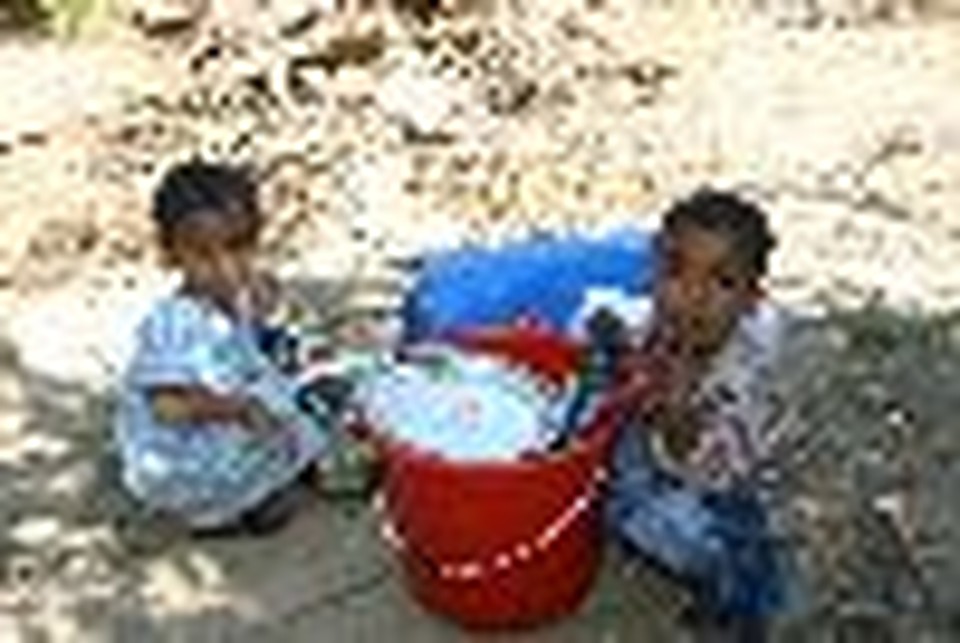In the Shadow of Death: The Little Ones Are Safe With Jesus

The photographs and images are now seared into our consciousness. One of the most troubling aspects of the disaster in Southeast Asia is the death of infants and young children. Moving at the speed of a jetliner, the walls of water fell on the young and the old alike--and so many of the youngest were simply swept away.
The death of the little ones poses anguished questions that reach to the depth of Christian faith. What happened to these young victims after death? Did they go to Heaven or to Hell?
That question is too pastorally loaded to be left hanging, only to be found at the end of this article. I am convinced that those who die in infancy and early childhood--along with the severely cognitively impaired--go to Heaven when they die. That is quite a claim, but it stands within the mainstream of orthodox Christian theology throughout the centuries, and I believe it is biblically and theologically sustainable.
In fact, I am hard pressed to imagine how any other answer can be given.
This is a question of emotional urgency for grieving parents, and it is a stone of stumbling for some who jump to hasty theological conclusions. The scope of the problem is huge, for untold millions of human beings have died at the earliest ages. Infant mortality still stands at several million babies a year. In the developing world, disease, famine, and abandonment take a heavy toll. Even in the most highly developed nations, armed with the latest medical technologies, thousands of infants die each year.
The best estimates out of Indonesia and Sri Lanka indicate that young children make up a disproportionate number of the victims of the tsunamis. Like Rachel in the Old Testament, anguished mothers weep for their children.
What is our answer to the question of the eternal destiny awaiting those children? My argument that these children are safe in the presence of Jesus Christ is based upon biblical evidence and theological reasoning. I cannot accept the glib and superficial assertions put forth by those who would simply offer assurance without adequate argument.
These infants are in Heaven, but not because they were not sinners. The Bible teaches that we are all conceived in sin and born in sin, and each of us is a sinner from the moment we draw our first breath. The doctrines of original sin and total depravity do not spring from some speculative theological imagination, but from the clear teaching of Scripture. There is no state of innocence, and these babies cannot enter Heaven unless the penalty for their sin is provided by the atonement of Jesus Christ.
These infants are in Heaven, but not because everyone is in Heaven. The Bible presents us with a stark picture of two destinies for humankind. Those who are in Christ, who have been redeemed by the blood of the Lamb, will be in Heaven. Those who are apart from Christ will be in Hell. Hell may be a despised concept--rejected by the theological modernizers--but it will not disappear, and its horrors await those who die without Christ. Jesus warned sinners to fear Hell, and the Bible warns that we must flee the wrath that is to come. Universalism is just not an option for any Christian who believes the Bible. Those who deny Hell deny the authority of Christ.
These infants are in heaven, but not because any of them were baptized. The practice of infant baptism has led to multiple theological confusions, and the death of infants is often one of the points of greatest bewilderment. Most of the early church fathers simply assumed that baptized infants who die in infancy go to Heaven, while unbaptized infants do not. These significant Christian leaders and thinkers, including figures such as Ambrose of Milan and Augustine of Hippo, taught the doctrine of baptismal regeneration--a belief still held by the Roman Catholic Church and most Eastern Orthodox churches.
Among Protestants, Lutherans hold to a form of baptismal regeneration and some sacramentalists in other denominations also lean in that direction. According to this logic, infants are saved because they have been baptized and have thus received the gift of salvation. There is simply not a shred of biblical support for this argument. What these churches call infant baptism cannot help us in framing our argument. There is no biblical foundation for arguing for the salvation of infants from baptism, or for positing the existence of "Limbo" as a place of eternal suspension for unbaptized infants.
So, how can we frame an argument that is true to Scripture and consistent with the Gospel? Before turning to Heaven, perhaps we should take a closer look at Hell. According to the Bible, Hell is a place of punishment for sins consciously committed during our earthly lives. We are told that we will be judged according to our deeds committed "in the body." [2 Corinthians 5:10] Adam's sin and guilt, imputed to every single human being, explains why we are born as sinners and why we cannot not sin, but the Bible clearly teaches that every person will be judged for his or her own sins, not for Adam's sin. The judgment of sinners that will take place at the great white throne [Revelation 20:11-12] will be "according to their deeds." Have those who died in infancy committed such deeds? I believe not, for they have not yet developed the capacity to know good from evil. No biblical text refers to the presence of small children or infants in Hell--not one.
Theologians have long debated an "age of accountability." The Bible does not reveal an "age" at which moral accountability arrives, but we do know by observation and experience that maturing human beings do develop a capacity for moral reasoning at some point. Dismissing the idea of an "age" of accountability, John MacArthur refers to a "condition" of accountability. I most often speak of a point or capacity of moral accountability. At this point of moral development, the maturing child knows the difference between good and evil--and willingly chooses to sin.
The Bible offers a fascinating portrait of this truth in the first chapter of Deuteronomy. In response to Israel's sin and rebellion, God condemns that generation of adults to death in the wilderness, never to see the land of promise. "Not one of these men, this evil generation, shall see the good land which I swore to give to your fathers." [Deuteronomy 1:35]. But God specifically exempted young children and infants from this condemnation--and He even explained why He did so: "Moreover, your little ones who you said would become prey, and your sons, who this day have no knowledge of good and evil, shall enter there, and I will give it to them and they shall possess it." [Deuteronomy 1:39] These little ones were not punished for their parents' sins, but were accepted by God into the Promised Land. I believe that this offers a sound basis for our confidence that God deals with young children differently than He deals with those who are capable of deliberate and conscious sin.
Infants in Heaven
Based on these arguments, I believe that we can have confidence that God receives all infants into Heaven.
Salvation is all of grace, and God remains forever sovereign in the entire process of our salvation. The Bible clearly teaches the doctrine of election, but it nowhere suggests that all those who die in infancy are not among the elect. Even the Westminster Confession, the most authoritative Reformed confession, states the matter only in the positive sense, affirming that all elect infants are received into Heaven. It does not require belief in the existence of any non-elect infants. Those who insist that all we can say is that elect infants are saved while non-elect infants are not, confuse the issue by assuming or presuming the existence of non-elect infants and leaving the matter there.
We must remember that God is both omnipotent and omniscient. He gave these little ones life, knowing before the creation of the world that they would die before reaching moral maturity and thus the ability to sin by intention and choice. Did He bring these infants--who would never consciously sin--into the world merely as the objects of His wrath?
The great Princeton theologians Charles Hodge and B. B. Warfield certainly did not think so. These defenders of Reformed orthodoxy taught that those who die in infancy die in Christ. Hodge pointed to the example of Jesus: "The conduct and language of our Lord in reference to children are not to be regarded as matters of sentiment, or simply expressive of kindly feeling. He evidently looked upon them as lambs of the flock for which, as the Good Shepherd, He laid down his life, and of whom He said they shall never perish, and no man could pluck them out of his hands. Of such He tells us is the kingdom of Heaven, as though Heaven was, in good measure, composed of the souls of redeemed infants."
Charles Spurgeon, the great evangelical preacher of Victorian England, and John Newton, the author of "Amazing Grace," added pastoral urgency to this affirmation. Spurgeon was frustrated with preachers who claimed to have no answer to this question, and he hurled judgment on anyone who would claim that infants would populate Hell.
In the end, we must affirm the Gospel of Jesus Christ and the full authority of Scripture. We trust the goodness, mercy, justice, and love of God. Whatever He does is right. Salvation is all of grace, and there is no salvation apart from Christ. All are born sinners, and those who reach the point of accountability and consciously sin against God will be judged and punished for their sins in Hell--unless they have come by grace to faith in the Lord Jesus Christ.
B. B. Warfield may have expressed it best when he beautifully affirmed, "If all that die in infancy are saved, it can only be through the almighty operation of Holy Spirit, who works when, and where, and how He pleases, through whose ineffable grace the Father gathers these little ones to the home He has prepared for them."
Keep those words firmly in mind as you contemplate this great and often troubling question. The little ones are safe with Jesus.

Want to Help? Check out our Tsunami Relief Effort List
Photo courtesy of New Directions International (www.newdirections.org)
Originally published January 05, 2005.




